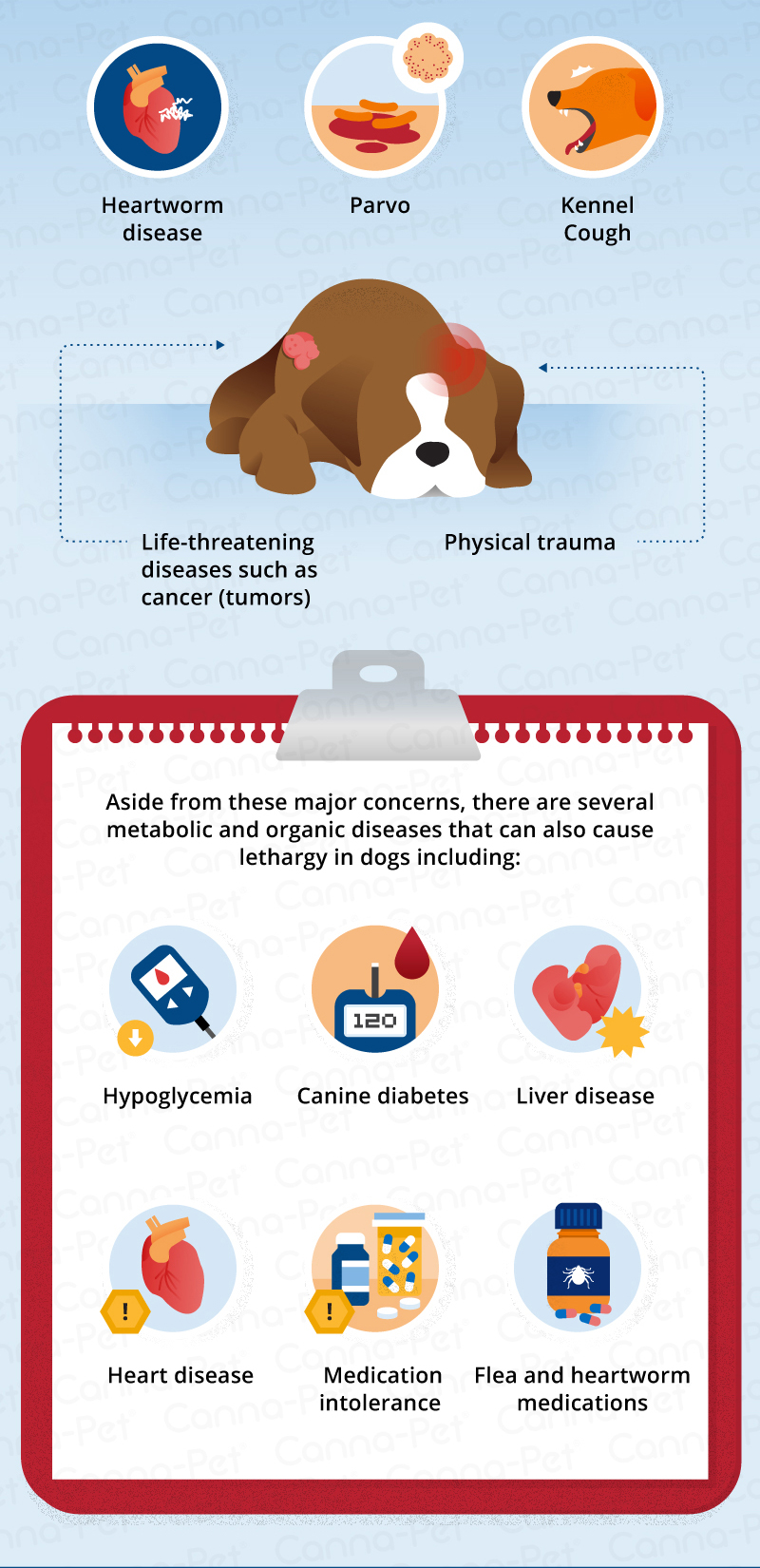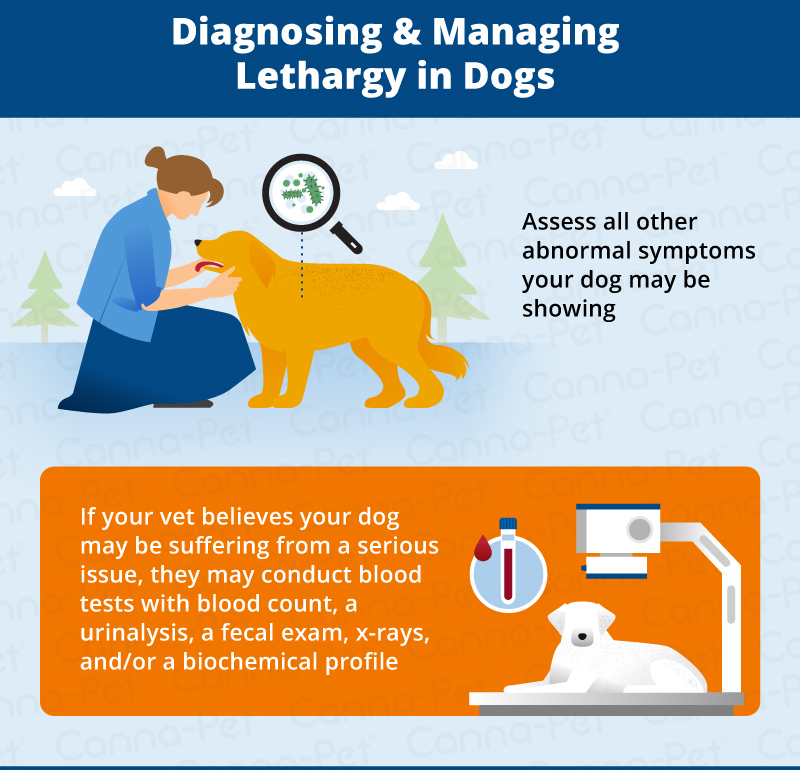It’s a lazy weekend at home, and you are going about your business, cleaning the house, making lunch, doing laundry. As you do, you notice your dog seems to be moping around, sleeping more than normal, and not behaving nearly as joyfully or playfully as he or she usually does.
As an animal lover, you know that most dogs like to spend their days eating and playing with their toys (much like children), interspersed with napping, sitting around soaking in patches of sunlight, and generally having a blast and enjoying life.
A perfectly healthy dog can average up to 10 hours of sleep a day or more, so seeing your dog sleeping a lot is not really that uncommon. But as a devoted pet owner, you know your dog well, and can sense when something is not quite right. Your instincts will alert you immediately if it seems their sleeping habits have become excessive, or if something else seems ‘off’ about their behavior.
It really doesn’t take much to please a dog, so when they experience pronounced mood or behavior changes, the changes are obvious.
However, you should be careful not to confuse a lethargic dog with a relaxed dog. A relaxed dog will still come when you call them, eat and drink normally, play with toys and respond to commands.
Sometimes dogs can seem to be lethargic because of too much exercise the day before, or perhaps due to weather changes. Ever feel drained and tired on a cloudy day? Dogs can feel the same way. Just like people, dogs can become overtired and need a day off to recuperate and get a little R&R.
It’s only when your dog doesn’t seem to be doing any of those things you would classify as ‘normal behavior’ or when an R&R period lasts more than 24 hours, that you should begin to be concerned.
Try not to get too distressed though. A dog appearing lethargic and tired for more than 24 hours could simply be a sign that your dog is coming down with a bug. Lethargy and weakness are common symptoms when a pooch isn’t feeling very well.
The downside to dog lethargy is that the root causes can be somewhat vague. This means it’s important to watch your dog closely and observe what other symptoms they may be displaying (if any) to help try to determine whether or not a trip to the vet is warranted.
Signs of Lethargy in Dogs
Dogs experiencing lethargy may:
- Sleep for an extended period of time, especially lengths of time you know is unusual for them.
- Display a delayed response to outside stimuli and the things going on around them.
- They may or may not respond when you call them.
- You might notice a marked lack of energy.
- Your dog could shun its food and water in favor of sleeping.
- Your dog may appear dazed or confused.
As an example, if your dog normally greets you with eager excitement when you arrive home, but one day lies there sleeping instead, with zero interest in your arrival, you can be fairly certain something is amiss.
If your dog is acting lethargic after a long day of activity or from a minor health bug that you are already aware of, there is usually no cause for concern. This type of lethargy usually will resolve itself within a day or so.
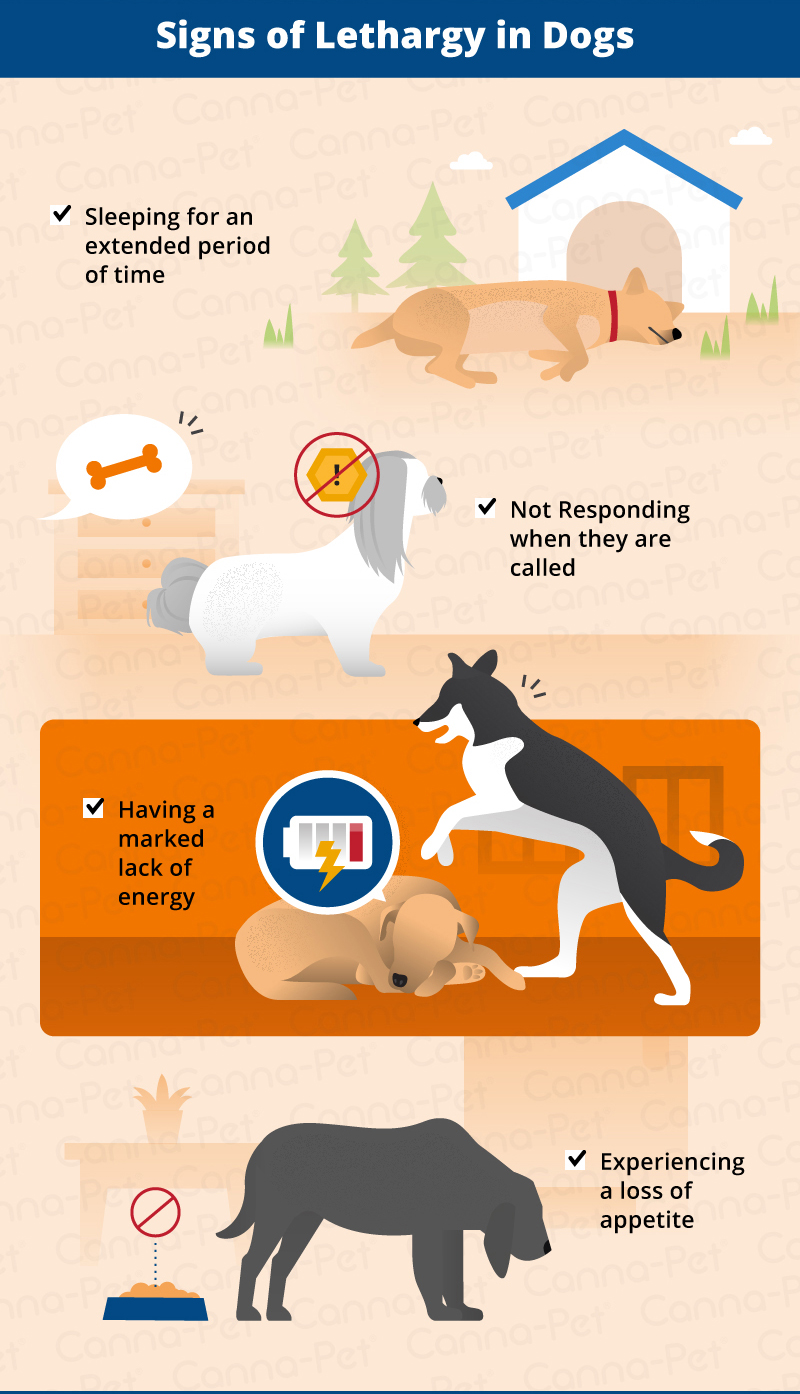
Causes of Lethargy in Dogs
However, if your dog appears to behave lethargically for longer than a day, or if your dog displays other symptoms as well, you might need to go ahead and book that vet appointment.
There are many health issues that can cause lethargy in your dog. Things like:
- Fever
- Dehydration
- Labored breathing (such as dogs with asthma)
- Diarrhea (especially acute or chronic diarrhea)
- Tremors
- Drugs or medications
- Various infections
- Inflammation
- Heart conditions
- Respiratory conditions
- Urinary tract infections
- Anemia and other blood disorders
- Snake bites
- Exposure to poisons or toxins (environmental or foods like onions, garlic, and leeks)
- Deficiencies in diet and nutrition
- Life-threatening diseases such as cancer (tumors)
- Physical trauma
Just like in humans, lethargy can also be a symptom of poor mental health in your dog. If your dog is depressed, anxious, or unhappy for any reason, it can manifest in lethargic behavior.
Sometimes a dog who seems lethargic may really be suffering from ‘exercise intolerance’. While the two conditions may overlap at times, and are related to each other, they are still classified as two very different conditions by most vets.
Distemper can cause additional symptoms along with lethargy, such as fever, coughing, and eye/nose discharge. Distemper symptoms can vary drastically from dog to dog, and can even cause neurological issues.
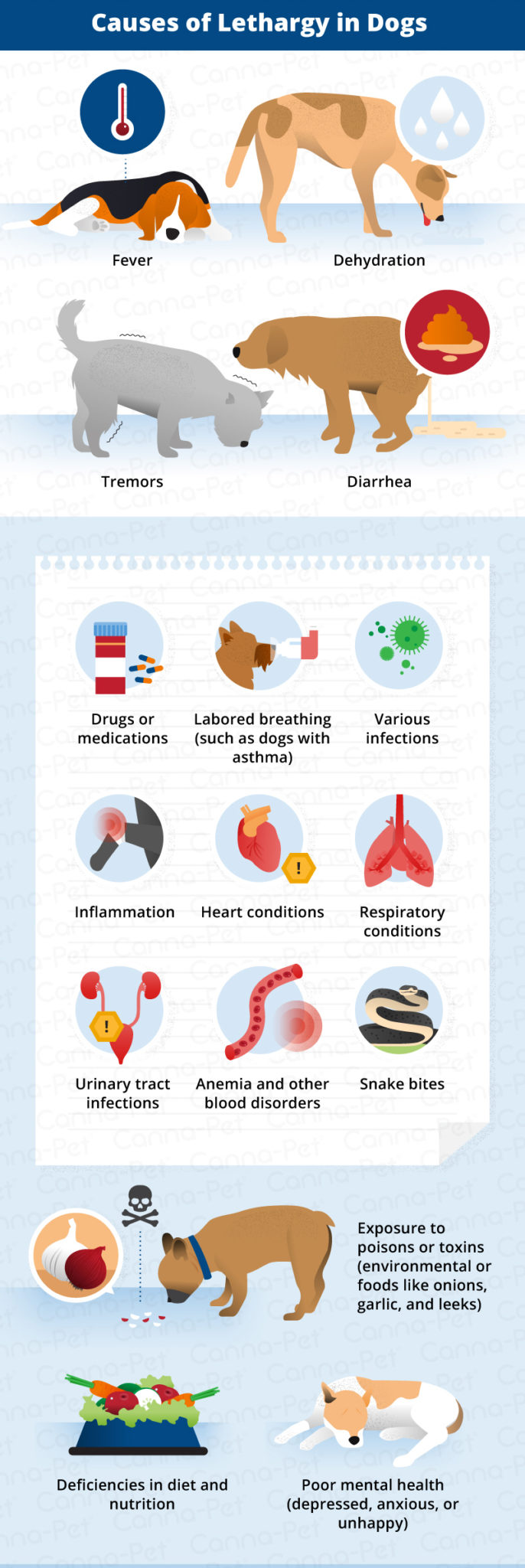
Parvo can cause abdominal pain, vomiting, and diarrhea, along with lethargy. Parvo is spread through feces.
Heartworm disease is caused by heart worms. Typically, your dog will develop heartworms because of mosquito bites, especially if they aren’t on any kind of preventative medication. Depression in dogs, fever, and weakness all accompany a dog with a heartworm problem.
Kennel cough is highly contagious and can cause lethargy. Your dog may experience a dry hacking type of cough as well as a fever.
Outside of those heath concerns, there are several metabolic and organic diseases that can also make your dog weak and lethargic.
- Hypoglycemia can weaken your dog and trigger seizures. Seizures can cause lethargy. Hypoglycemia is when your dog’s blood sugar is dangerously low, as opposed to diabetes, which is the opposite.
- Canine diabetes occurs when your dog’s sugar is dangerously high. Your dog may also present with appetites changes, weight loss, and excessive thirst.
- Liver disease can cause lethargy in your dog, and be accompanied by abdominal bloating, jaundice, loss of appetite, and signs of depression.
- Heart disease is a potentially fatal health condition, and lethargy as well as exercise intolerance can be warning signs for congestive heart failure. As a dog’s condition progresses, appetite loss and rapid breathing may also develop.
- Medications can make dogs lethargic and lose interest in their normal day-to-day activities. Pay attention when you give your pets medications and drugs, and if they cause any adverse symptoms, let your vet know.
- Flea and heartworm medications can sometimes trigger lethargy too. Remember to keep human medications well beyond your dog’s reach. OTC drugs like ibuprofen are poisonous for animals.
Lethargy in Puppies & Young Dogs
Causes of lethargy in young dogs more often than not is related to parasites. Hookworms, ticks and fleas (especially if your animal is highly infested), heartworms (especially on dogs who aren’t on preventives), as well as infectious diseases such as the Parvovirus can cause lethargy.
Additionally, younger dogs can suffer from lethargy as a result of congenital heart diseases, pneumonia, anemia, fevers, and malnutrition.
Lethargy in Older Dogs
If your dog is older, some things to consider that might be causing your dog to be lethargic include osteoarthritis, as well as general pain, heart disease, diabetes, excessive weight, hypothyroidism (yes, dogs can get that too), as well as tick-born diseases. Serious infections such as Parvo, heartworm disease, distemper, kennel cough, the bacterial infection leptospirosis, can all be culprits of lethargy in older dogs.
Keep in mind that as your dog ages, some lethargy will be normal. Especially if your dog has osteoarthritis. Osteoarthritis makes activity painful, which means your dog will try to avoid moving around too much as their pain becomes more pronounced.
Other health conditions that are painful and trigger lethargy are:
- Hip dysplasia
- Cancer
- Ear infections
- Dental disease
- Glaucoma and other eye conditions
- Pancreatitis
- Anal sac issues
- Urinary tract infections
If your dog experiences persistent vomiting, or you notice blood in their stool along with lethargic behavior, you should see your vet immediately.

Something else to note is that your dog’s environment can be a cause of lethargy. When a dog is frightened because they are in a new home, or even when they are afraid due to thunder, fireworks, or gun fire, you may notice changes in their mood or behavior. Major changes in your household such as the death of a loved one, or even the death of another pet, can leave your dog feeling down and blue much like a human might feel.
Diagnosing & Managing Lethargy in Dogs
Obviously if you notice your pet is behaving in a lethargic manner, it can be concerning. However, it’s important to assess your pet for other symptoms as well, and notice whether or not they exhibit any additional abnormal behaviors. You might consider writing down your findings, and book an appointment with your vet if your dog doesn’t seem to perk up after a day or so.
If there are no other symptoms, your vet might recommend further testing to try to rule out any other accompanying health conditions. Baseline lab tests are always useful to help your vet identify things that could require a closer look. They might ask for blood tests with blood count, a urinalysis, a fecal exam, x-rays, and/or a biochemical profile.
If your vet finds anything concerning or notices any abnormalities, he could recommend other tests, such as bacterial cultures, biopsies, MRI or CT scans, cardiac ultrasounds, a behavioral assessment, or even a complete neurological exam.
Dog lethargy is not a condition that a vet will treat in and of itself, but your vet will look for underlying causes for the lethargy and attempt to treat those conditions. Because lethargy can be attributed to a number of health problems and concerns, it should never ever be ignored.
Food, Nutrition, and Activity
It’s important to rule out any health problems that may be interfering with your dog’s ability to absorb nutrients from their food, such as a worm infestation or inflammatory bowel disease. It’s also important to make sure that you are feeding your dog a healthy, well-balanced diet. You might consider food rotation to ensure they are getting all of the vitamins and minerals they need.
Finally, remember that just like people, dogs can get bored. Examine your lifestyle and see what you can improve upon to make sure that your pet is being properly stimulated, and that they are getting plenty of exercise. Much like people, when dogs get bored they sleep, and it’s very easy for them to sink into a depression as a result.
If you have a large dog but live in a small apartment, it’s vital to make sure that you take your dog outside for regular play and exercise.
Also, regardless of the size of your dog, if your pet spends the whole day locked up in a crate it shouldn’t surprise you much when they sink into boredom and depression. Think of how you feel when you’re locked up in a house day in and day out with nothing to occupy your time.
If you think your dog may be bored or on the edge of depression, try leaving your pet free to roam your home, with plenty of toys to keep them occupied.
You might also consider getting a secondary animal if you don’t already have one, so that your pets can keep each other company. This is especially helpful if you find that you are away from home fairly often or for hours at a time.
Your dog will develop healthy and lasting attachments to other pets, so it’s nice when you are able to provide them with a playmate. If you can’t have more than one pet yourself, consider alternatives, like frequent visits to a dog park, or making play dates with friends who have dogs.
Create opportunities for your dog to socialize with other canines, and just like people, they will be all the happier for it.
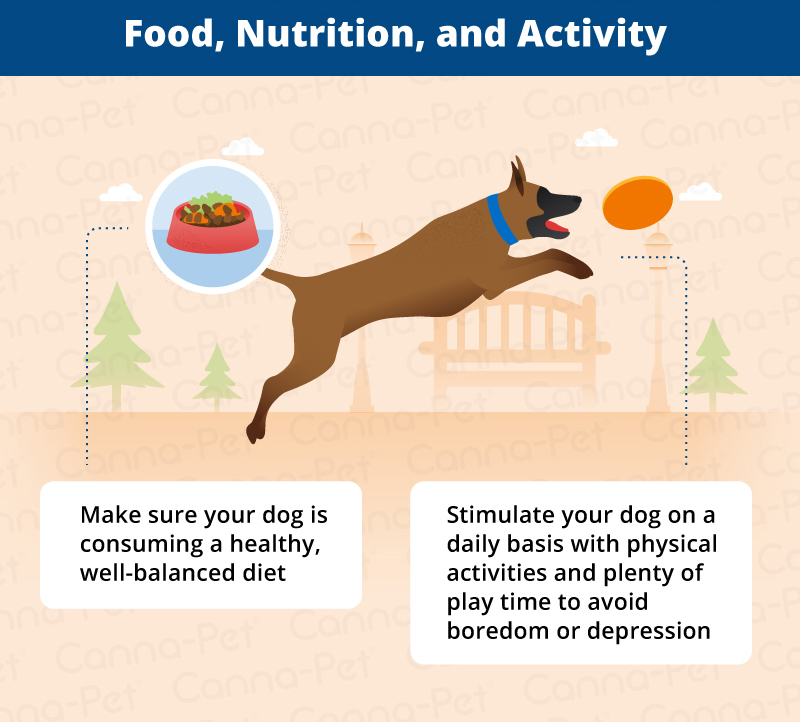
At the end of the day, you know your dog the best. You know if your dog is acting lethargic, or if he or she is just tired from a busy day. Your instincts will tell you when something more is wrong. Listen to your instincts, and if you feel that there is an underlying cause to your dog’s lethargy, see your vet immediately.
Sources:
- “Dog Weakness and Lethargy: Causes and Treatments.” WebMD, Accessed 18 March 2017. www.pets.webmd.com/dogs/my-dog-weak-lethargic#1.
- “5 Reasons Your Pet Is Lethargic (and When to Worry).” PetMD, Accessed 18 March 2017. www.petmd.com/dog/slideshows/5-reasons-your-pet-is-lethargic.
- “How to Treat Sudden Lethargy and Exercise Intolerance in Dogs.” Vetstreet, Feb. 2014, Accessed 18 March 2017. www.vetstreet.com/care/my-pet-is-suddenly-tired-and-weak-what-is-causing-this.
- “The Common Symptom of Many Pet Disorders.” Healthy Pets, Accessed 18 March 2017. www.healthypets.mercola.com/sites/healthypets/archive/2017/09/16/lethargy-in-dogs-cats.aspx.
- “10 Warning Signs You Should Take Your Dog To The Vet”. Health Line, Accessed 18 March 2017. https://www.healthline.com/health/9-warning-signs-dog-needs-veterinarian



